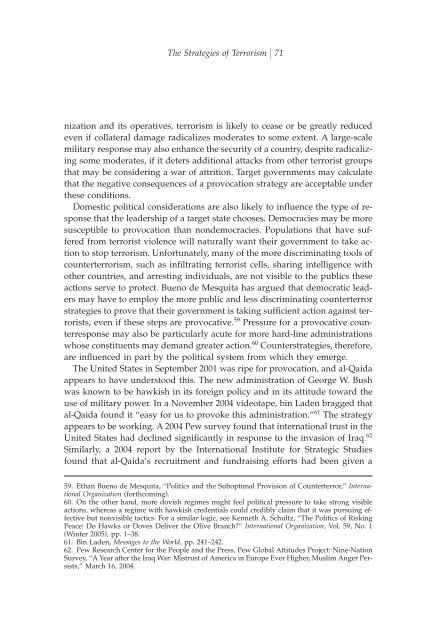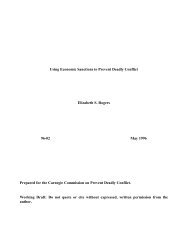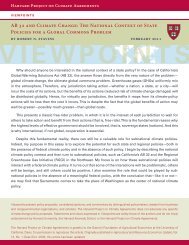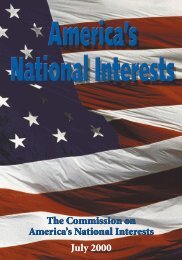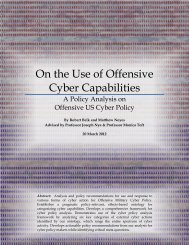The Strategies of Terrorism - MIT Press Journals
The Strategies of Terrorism - MIT Press Journals
The Strategies of Terrorism - MIT Press Journals
Create successful ePaper yourself
Turn your PDF publications into a flip-book with our unique Google optimized e-Paper software.
<strong>The</strong> <strong>Strategies</strong> <strong>of</strong> <strong>Terrorism</strong> 71nization and its operatives, terrorism is likely to cease or be greatly reducedeven if collateral damage radicalizes moderates to some extent. A large-scalemilitary response may also enhance the security <strong>of</strong> a country, despite radicalizingsome moderates, if it deters additional attacks from other terrorist groupsthat may be considering a war <strong>of</strong> attrition. Target governments may calculatethat the negative consequences <strong>of</strong> a provocation strategy are acceptable underthese conditions.Domestic political considerations are also likely to inºuence the type <strong>of</strong> responsethat the leadership <strong>of</strong> a target state chooses. Democracies may be moresusceptible to provocation than nondemocracies. Populations that have sufferedfrom terrorist violence will naturally want their government to take actionto stop terrorism. Unfortunately, many <strong>of</strong> the more discriminating tools <strong>of</strong>counterterrorism, such as inªltrating terrorist cells, sharing intelligence withother countries, and arresting individuals, are not visible to the publics theseactions serve to protect. Bueno de Mesquita has argued that democratic leadersmay have to employ the more public and less discriminating counterterrorstrategies to prove that their government is taking sufªcient action against terrorists,even if these steps are provocative. 59 <strong>Press</strong>ure for a provocative counterresponsemay also be particularly acute for more hard-line administrationswhose constituents may demand greater action. 60 Counterstrategies, therefore,are inºuenced in part by the political system from which they emerge.<strong>The</strong> United States in September 2001 was ripe for provocation, and al-Qaidaappears to have understood this. <strong>The</strong> new administration <strong>of</strong> George W. Bushwas known to be hawkish in its foreign policy and in its attitude toward theuse <strong>of</strong> military power. In a November 2004 videotape, bin Laden bragged thatal-Qaida found it “easy for us to provoke this administration.” 61 <strong>The</strong> strategyappears to be working. A 2004 Pew survey found that international trust in theUnited States had declined signiªcantly in response to the invasion <strong>of</strong> Iraq. 62Similarly, a 2004 report by the International Institute for Strategic Studiesfound that al-Qaida’s recruitment and fundraising efforts had been given a59. Ethan Bueno de Mesquita, “Politics and the Suboptimal Provision <strong>of</strong> Counterterror,” InternationalOrganization (forthcoming).60. On the other hand, more dovish regimes might feel political pressure to take strong visibleactions, whereas a regime with hawkish credentials could credibly claim that it was pursuing effectivebut nonvisible tactics. For a similar logic, see Kenneth A. Schultz, “<strong>The</strong> Politics <strong>of</strong> RiskingPeace: Do Hawks or Doves Deliver the Olive Branch?” International Organization, Vol. 59, No. 1(Winter 2005), pp. 1–38.61. Bin Laden, Messages to the World, pp. 241–242.62. Pew Research Center for the People and the <strong>Press</strong>, Pew Global Attitudes Project: Nine-NationSurvey, “A Year after the Iraq War: Mistrust <strong>of</strong> America in Europe Ever Higher, Muslim Anger Persists,”March 16, 2004.


